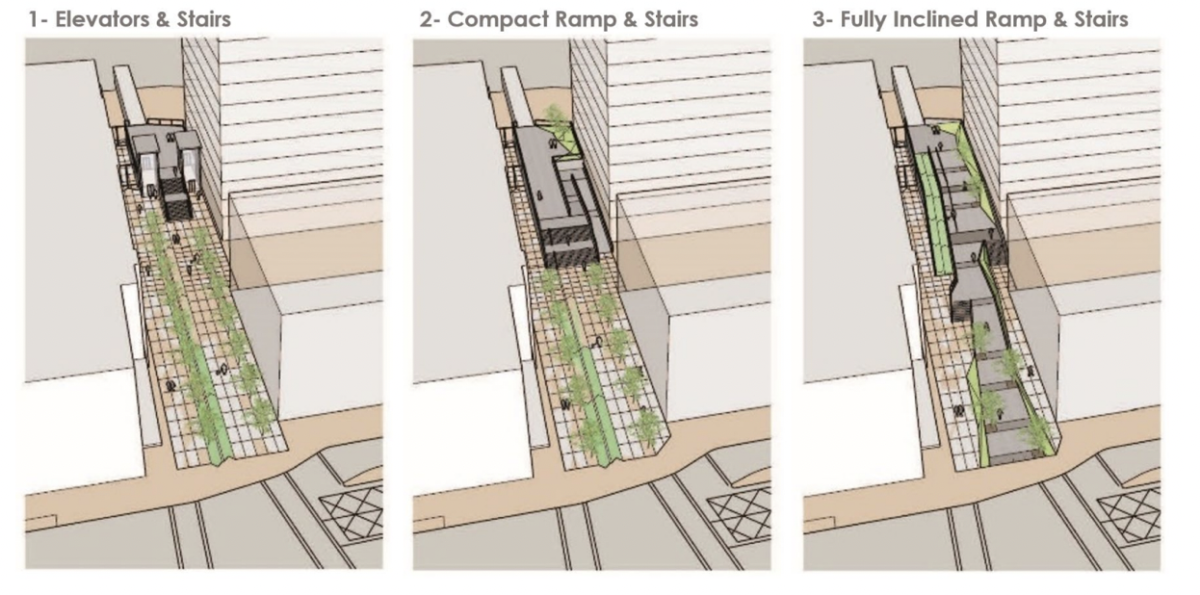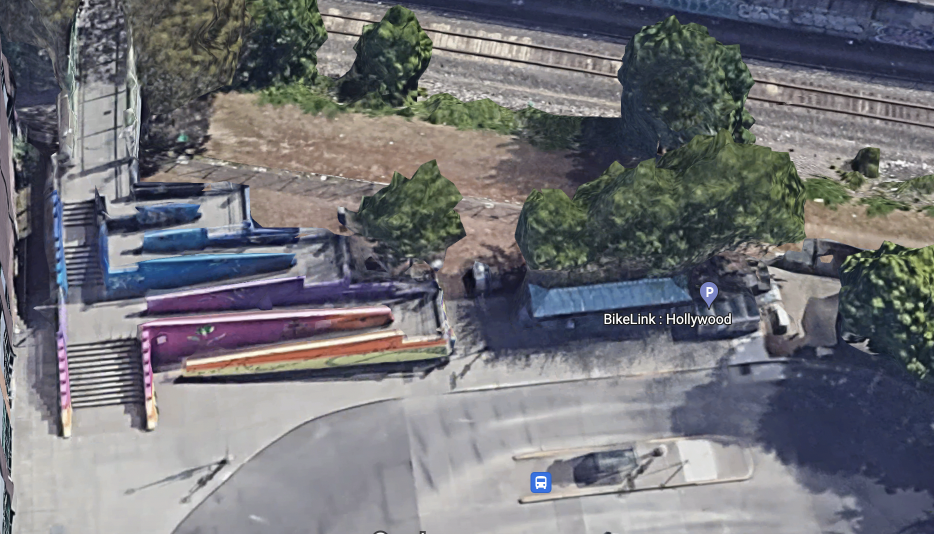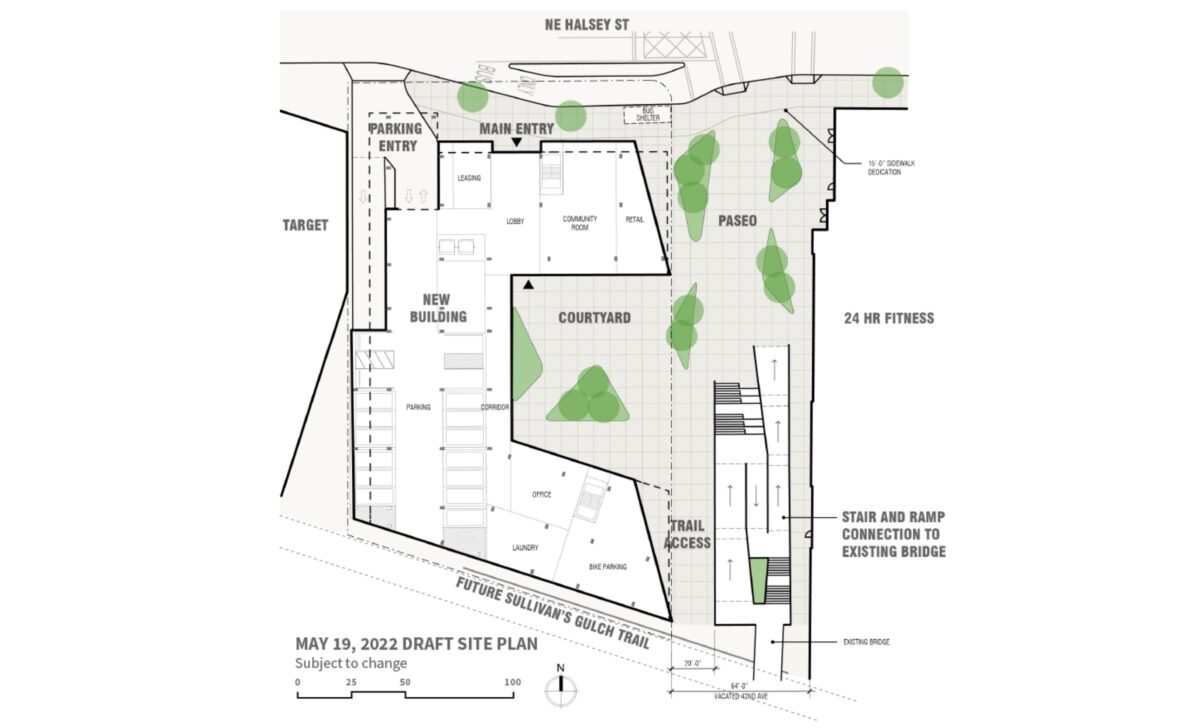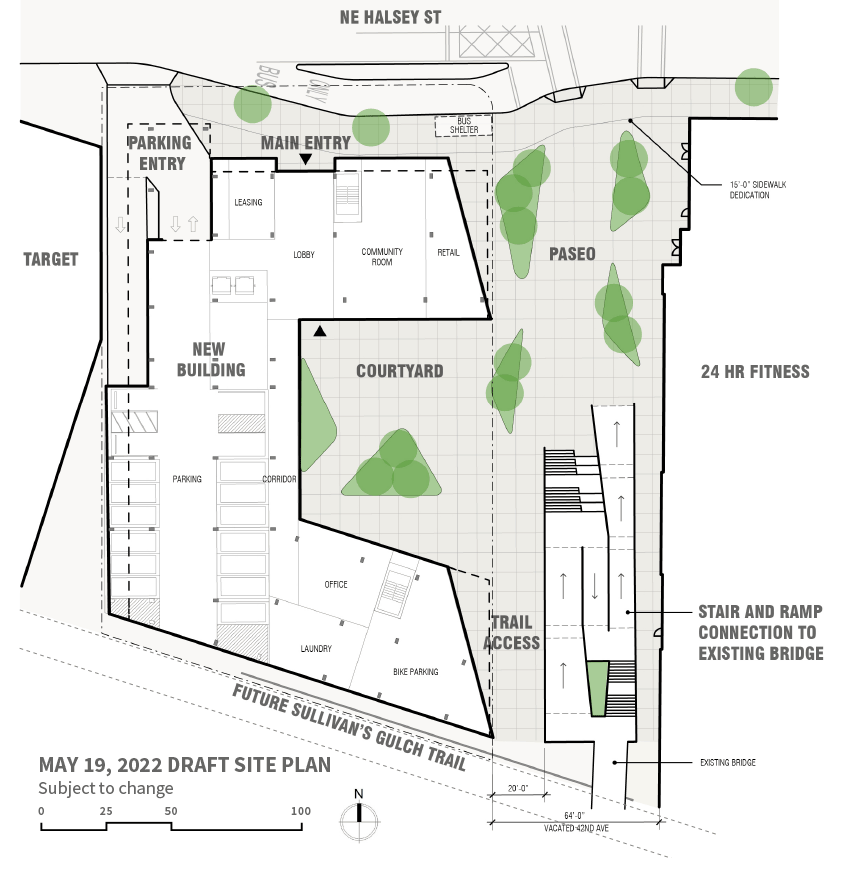The collaboration between TriMet and affordable housing developer BRIDGE Housing to transform the Hollywood Transit Center (HTC) into the “HollywoodHub” – a redesigned light rail and bus station with a 200-unit housing development and new courtyard – is moving forward. HollywoodHub planners presented their latest design proposal to the Portland Design Commission in July and received positive feedback, particularly for the planned transportation infrastructure changes.
But transportation advocates, who have had several concerns about the HollywoodHub design since it was first made public, still aren’t satisfied with the proposal. And before TriMet constructs such a huge project that could set the stage for the future of transit and housing development in Portland, they’d like to see some changes.
Today, the Hollywood Transit Center (HTC) – located on the south side of NE Halsey St between NE 41st and 42nd avenues – is home to several bus and light rail lines, and a carfree I-84 crossing. The Hollywood crossing is the only carfree I-84 overcrossing other than the Blumenauer Bridge 35 blocks west. Despite its usability shortcomings, it’s a popular route because it’s in a transit and destination-rich hotspot. TriMet sees this project as an opportunity to improve the transportation facilities .
The ramp


“The argument that it’s better than current conditions does not necessarily mean that it’s good…I really wish that this would be thought of as the important bike connection that it is within our network.”
-David Stein, Bicycle Advisory Committee
One of the main problems with the current HTC, especially for people on bikes, is the switchback ramp on the north side of the I-84 crossing. This ramp doesn’t meet Americans with Disabilities Act requirements because of its very tight turns that make it very hard to traverse on wheels. The design encourages people biking up or down the ramp to dismount their bikes and walk, which can be an annoying snag in a bike commute and may not be possible at all for someone using a mobility device. So when TriMet announced they were going to redesign the transit center, advocates thought it would be a good opportunity to make some much-needed changes to the ramp.
While developing the design for the HollywoodHub north ramp, planners at TriMet looked at three different options: an elevator/stair combination, a long ramp and a condensed ramp/stair combo (‘stramp’) with switchbacks, which is what they decided to go with. At the August Portland Bicycle Advisory Committee meeting, TriMet Project Manager Catherine Sherraden talked about why they went with this ramp over the longer ramp that bike advocates preferred.
“This is intended as a space where you really do have to stop and get off your bike.”
– Catherine Sherraden, TriMet
“The elevator and stairs were very unpopular because elevators are difficult to maintain,” Sherraden said. “The long ramp…had a lot of benefits that people could see. The main problem was that we need the front half of the site as a fire lane. It was not possible to do [the long ramp] and comply with code to create a fire lane for both the 24 Hour Fitness and the new housing building.”
The condensed ramp as currently planned will have two switchbacks compared to the seven it has now, which is an improvement. But TriMet planners say it still won’t be set up for people to roll down without dismounting.
“This is intended as a space where you really do have to stop and get off your bike,” Sherraden said at the August BAC meeting. “We really don’t want people biking down a ramp at high speeds in a short space like this.”
BAC member David Stein said he was disappointed by this design, even though it’s an improvement from the current ramp design.
“The argument that it’s better than current conditions does not necessarily mean that it’s good,” David Stein said at the August BAC meeting. “I really wish that this would be thought of as the important bike connection that it is within our network.”
Bus stop relocation


In addition to the ramp design, advocates have expressed concern about the proposed relocation of the southbound 75 and westbound 77 bus stops away from the transit hub and across Halsey. TriMet says they’ll work with the Portland Bureau of Transportation to make it safer to cross the Halsey/42nd intersection, but critics are unsure.
In a 2021 letter to TriMet, BAC members wrote “the removal of buses from the Transit Center will result in a substantial degradation in the experience for transit riders” and make it more dangerous for people rushing to transfer from the MAX to the bus. The letter also points out that it won’t be possible to provide sufficient for riders on the narrow sidewalks on 42nd and Halsey.
Finding common ground
At the Hollywood Transit Center in 2017, self-described white nationalist Jeremy Christian stabbed three people who stood up to him while he threatened two Black teenagers. Two of the people died and one was seriously injured. To commemorate their lives and bravery, TriMet installed a memorial mural on the HTC’s north ramp. The transit agency says memorializing this incident is a central part of their plan for the HollywoodHub.
“The May 2017 tragedy will inform the design ethos and expression of the overall site, to create an inclusive public space that fosters a sense of belonging,” TriMet states on the project website.
Advocates critical of the project say they don’t want to stand in the way of the HollywoodHub as a concept. Combining dense housing with transit access is a proven way to reduce reliance on cars and make transportation access more equitable, and the goal to create a new public plaza at a space that was the site of such a tragic event is a good one. In the letter from last summer, BAC members wrote they “strongly support building new affordable housing at this location” and “hope [they] can work with the project team to find alternative concepts that provide affordable housing while enhancing the experience for people on bicycles, on foot, and riding transit.”
There’s still time to make changes so advocates feel they’re on the right track. TriMet expects to begin construction on the ramp replacement in early 2024, but the design for the entire project is still conceptual and not yet concrete. We’ll keep you posted on how the HollywoodHub design plays out as TriMet and its partners continue finalizing the plan and seek further city approval.







